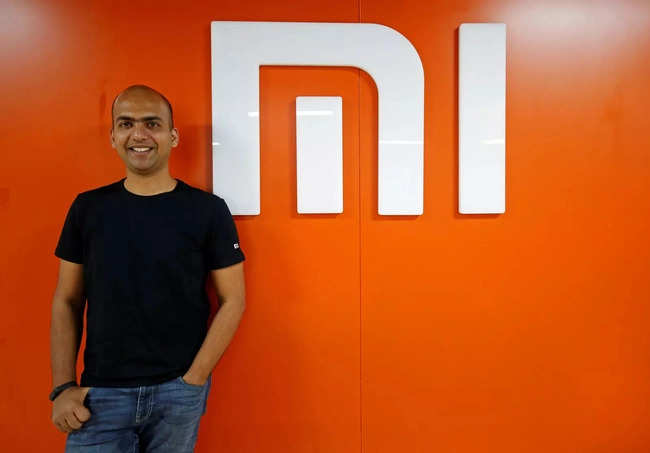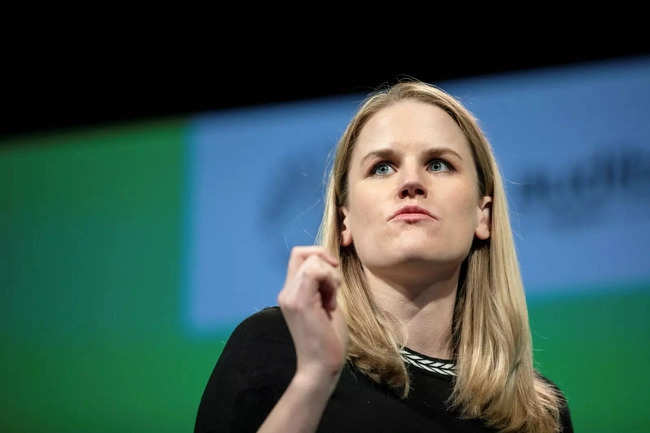Credit: Giphy
Also in this letter:
■ Infosys net profit up 12% year-on-year in March quarter
■ ED summons former Xiaomi India head Manu Jain in investigation
■ Whistleblower Frances Haugen criticises Meta’s metaverse plans
Pine Labs picks up majority stake in Mosambee, to bolster payments play

Pine Labs CEO Amrish Rau
Digital payments and financial services provider Pine Labs has picked a majority stake in Mosambee, a payment solutions provider. With this, Mosambee is valued at more than $100 million, the company said.
As a part of the deal, Mosambee’s leadership team will continue to operate independently, with Pine Labs leveraging its proprietary tech platform.
Why? The merchant-focussed fintech firm has been looking for fintech software and infrastructure providers to bolster its offerings for small and medium enterprises (SMEs), and to launch new offerings. Founded in 2008, Mosambee offers payment solutions for online and offline merchants and has clients in India and six other countries.
IPO plans: The acquisition comes as Pine Labs has been raising funds, gearing up for an initial public offering (IPO) in the US.
We reported on March 29 that it had raised $50 million from London-based private equity major Vitruvian Partners at a valuation of just over $5 billion.
In February, Pine Labs had raised $150 million in primary and secondary funding from Alpha Wave Global.
LazyPay partners with Zepto: Meanwhile, PayU’s ‘buy now, pay later’ (BNPL) solution LazyPay has expanded into the quick commerce market through a partnership with Zepto, a 10-minute grocery delivery platform. It said the partnership would help expedite Zepto’s client adoption by using LazyPay’s large customer base.
Other Done Deals
■ IT security startup Securden has raised $10.5-million in a funding round led by US-based private equity investor Tiger Global, its chief executive officer, Bala Venkatramani, told us. Accel and Together Fund also participated in the round.
■ Zipy, a self-serve software as a service (SaaS)-based debugging platform, has raised $2.8 million in a seed round led by Blume Ventures and founder-focused venture capital fund Together. The round also saw participation from seed funds BoldCap and FirstCheque, besides investments from a clutch of industry veterans.
■ HCL Technologies has expanded its global partnership with digital banking solutions provider Avaloq. With this partnership, HCL said it would develop a lifecycle management centre for Avaloq clients and invest in ongoing training and development for HCL teams working with Avaloq products.
Infosys net profit rises 12% year-on-year to Rs 5,686 crore in March quarter

Infosys’s consolidated net profit rose 12% year-on-year to Rs 5,686 crore for the quarter ended March. The company reported a 29.8% on-year rise in consolidated revenues at Rs 32,276 crore.
Details: This was higher than street estimates as year-on-year revenue growth was seen in the range of 22.5-25%. But profit growth fell short of the expected 15-19.5% year-on-year.
- On a sequential basis, net profit was down 2.1% while revenue grew 1.3%.
- For the financial year ended March, the company’s consolidated revenue rose 21.1% to Rs. 121,641 crore and net profit clocked Rs 22,110 crore, up 14.3%.
- The company also met revenue growth of 19.5-20% in constant currency projected for FY21. Operating margin for the quarter stood at 21.5%.
Attrition rises: Attrition rate for the quarter rose to 27.7% compared to 25.5% in the December quarter. Employee headcount grew by 21,948 to reach 314,015. The company hired 85,000 freshers in the last fiscal and expects to hire over 50,000 in the next fiscal.
Guidance: The Bengaluru-based company also guided for 13-15% sales growth in constant currency terms in 2022-23 and an operating margin band of 21-23%. This is an increase from the previous year’s initial sales growth guidance range of 12-14%.
Quote: Salil Parekh, CEO and MD, said, “With the acceleration of digital disruptions across industries, we see immense potential to engage and partner with clients as they transform, adapt and thrive. We will scale talent globally, invest in employees and accelerate innovation and digital capabilities to capitalise on the expanding market opportunities.”
Larger rival TCS reported its fourth quarter results on Monday.
Tweet of the day
ED summons former Xiaomi India head Manu Jain in investigation

Xiaomi Corp’s former India head Manu Kumar Jain
The Enforcement Directorate (ED) has summoned the former India head of China’s Xiaomi Corp, Manu Kumar Jain, for questioning in a probe linked to an alleged violation of India’s foreign exchange law.
FEMA probe: The federal probe agency is investigating the company and its executives under the provisions of the Foreign Exchange Management Act (FEMA) linked to foreign remittances, PTI reported.
The ED has been probing the company since at least February, and in recent weeks asked Jain to appear before its officers.
Company’s response: A Xiaomi spokesperson said the company abides by all Indian laws and was “fully compliant with all the regulations”.
“We are cooperating with authorities with their ongoing investigation to ensure they have all the requisite information,” it said in a statement.
Wider crackdown? The actions signal widening scrutiny of the Chinese smartphone maker, whose India office was raided in December in a separate investigation over alleged income tax evasion. Some other Chinese smartphone markers were also raided at the time.
Facebook whistleblower Frances Haugen criticises Meta’s metaverse plans

Facebook whistleblower Frances Haugen
Last year, former Facebook employee Frances Haugen shook up the company by leaking hundreds of internal documents and accusing the social media network of not doing enough to curb the spread of misinformation. Now, Haugen is taking on Facebook (now Meta) again, this time over the very thing that prompted its 2021 rebrand – the metaverse.
In an interview with Politico, Haugen said Meta has made “very grandiose promises” about how the metaverse is secure by design, but that if they didn’t commit to openness, access, and other accountability measures, “I can imagine just seeing a replay of all the problems you see on Facebook.”
Also Read: Frances Haugen and the power of one
Metaverse or dystopia? For the company’s vision of the metaverse to become a reality, so to speak, intrusive hardware such as sensors, microphones and cameras would have to be installed in homes and maybe even public spaces to record data and replicate it in the digital world.
Quote: “I’m super concerned about how many sensors are involved. When we do the metaverse, we have to put lots more microphones from Facebook; lots more other kinds of sensors into our homes,” Haugen told Politico. “You don’t really have a choice now on whether or not you want Facebook spying on you at home. We just have to trust the company to do the right thing.”
Elon Musk is sued by shareholders over delay in disclosing Twitter stake

Elon Musk has been sued by former Twitter Inc shareholders who claim they missed out on the recent run-up in its stock price because he waited too long to disclose a 9.2% stake in the social media company.
Joint lawsuit: In a proposed class action filed in Manhattan federal court, the shareholders said Musk made “materially false and misleading statements and omissions” by failing to reveal he had invested in Twitter by March 24 as required under federal law.
Taking stock: Twitter shares rose 27% on April 4, from $39.31 to $49.97, after Musk disclosed his stake.
Former shareholders led by Marc Rasella said the delayed disclosure let Musk buy more Twitter shares at lower prices, while defrauding them into selling at “artificially deflated” prices.
Also Read: Elon Musk, Twitter’s new technoking
What the law says: US securities law requires investors to disclose within 10 days when they have acquired 5% of a company, which in Musk’s case would have been March 24.
Today’s ETtech Top 5 newsletter was curated by Arun Padmanabhan in New Delhi and Zaheer Merchant in Mumbai.
























